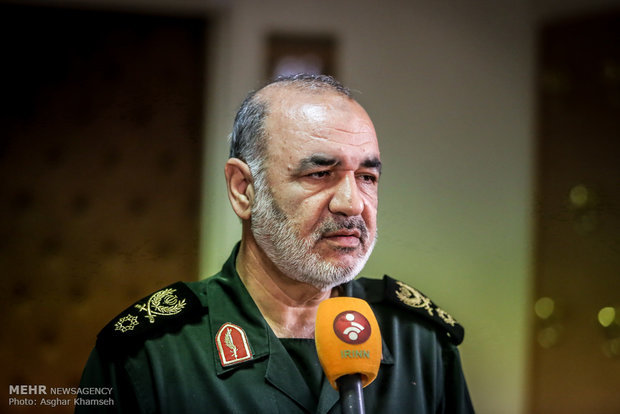Top IRGC commander says military precedes politics

TEHRAN – The deputy commander of the Islamic Revolutionary Guards Corps has said politics and diplomacy come next to military power, warning that officials should not trust Washington.
“Power should lead politics and diplomacy,” said Hossein Salami in a television program broadcast on Saturday night.
The commander cited the current situation in the region as evidence for the failure of diplomacy, and rapped the U.S. and terrorists for acting unfairly.
“The Americans and terrorists don’t act fairly and justly, and understand the language of power only.”
In making the comments, Salami was referring to the recent liberation of Aleppo by the Syrian army, a stronghold of terrorists for nearly five years.
The loss of Aleppo, he added, was an end to ambitions nurtured by the U.S. to create a new order in the Middle East, he stated.
“The Americans planned to expand their move into Lebanon and Iraq just to reach Iran and create a new order in the Middle East.”
Last week IRGC chief Mohammad Ali J’fari in comments called Aleppo “the frontline of the Islamic Revolution and said the security of Iran has expanded much beyond its territorial borders.
‘Missile capability deterring enemies’
Talking on the power-politics dichotomy, Salami further related a secure Iran to its missile capability that has created and boosted deterrence.
“Today, our missile capability has turned into a deterrent power well perceived by the enemies of Iran.”
“Iran’s missile capability has depicted nuanced pictures in the minds our enemies,” he further said.
Iran test-fires missiles of different ranges and capabilities year round during regular military drills to keep its armed forces on their toes and has developed home-grown missile classes.
Ahmad Vahidi, former defense minister, previously placed Iran among the top five powers in the world that have the technology to launch precision-guided missiles.
In April, Ali Abdollahi, an IRGC official, said Iran had test-fired a precision-guided ballistic missile with a range of 2,000 kilometers and an error margin of eight meters, though news was not confirmed by other senior officials.
AK/PA
